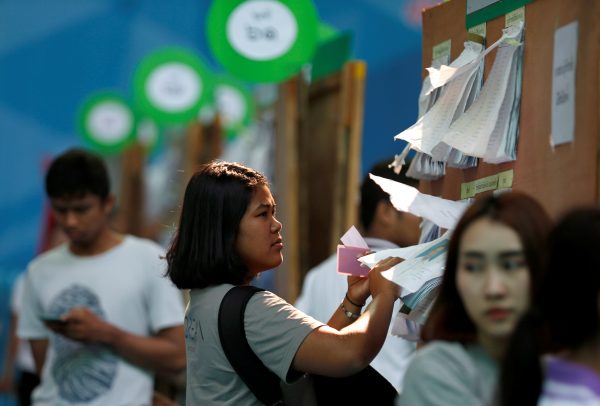By virtue of Article 272 of the Constitution, Thailand’s next leader will be chosen through a free vote of all parliamentarians, both junta-appointed senators and elected members of the lower house. If a nominee for prime minister receives 376 votes in the bicameral parliament of 750, they will be able to form a cabinet. Prayuth’s Phalang Pracharat party performed above expectations and has 117 lower house seats, close to the 126 seats that would give him the required 376 after also accounting for the support of 250 appointed senators.
But the poll results enable multiple actors to claim the right to form government. Junta-party Phalang Pracharat won the most votes. Thaksin-aligned Pheu Thai won the most seats. And the self-described pro-democracy block, which includes Pheu Thai and the new Future Forward Party, narrowly controls the majority of lower house seats. Between now and early June when parliament finally assembles, we can expect a phoney war as each side trumpets their claims to form government.
The latter parties hope to exert moral suasion on the senators and the two parties, Phumchai Thai and the Democrat Party, who are yet to indicate their allegiances. But the cold hard reality, only now dawning on many Thais because of rushed and inadequate consultation over the 2016 constitutional referendum, is that the new Constitution was always designed to give the pro-military party a big leg up.
Will this election deliver stability? Even before parliament convenes, various trigger points could derail this fragile and partial return to democracy. The appalling performance of Thailand’s Electoral Commission will probably not fatally undermine the validity of the election, but it will have come close. Thais are understandably outraged by the frequent revisions, inexplicable discrepancies and inexcusable failure to deliver 1500 votes from Thai citizens in New Zealand in time to be counted.
But political parties are not walking away from the process, as fraud seems neither systematic nor widespread. There will be a process of investigating allegations of misconduct and this could result in by-elections. Perhaps more dangerous to public and international confidence would be another party dissolution, in particular if it involves the new Future Forward Party. Their strong showing, especially among Thailand’s youth, was one of the remarkable features of this election.
The rise of Future Forward suggests a turning point of sorts in the Thai political landscape. Pheu Thai’s vice-like grip on Thailand’s populous north and northeast cracked and both Phalang Pracharat and Future Forward claimed seats, each with starkly different approaches. Phalang Pracharat offered welfare payments as well as military-backed stability to those afraid of a return to the colour-group clashes of 2006–2014. They also took a leaf out of Thaksin’s playbook, recruiting former Pheu Thai candidates.
By comparison Future Forward appears to represent a brand entirely new to Thailand: conviction politics. Led by charismatic leader Thanathorn Juangroongruangkit, Future Forward campaigned on a platform of liberal democratic principles and forever ending military involvement in politics. Cutting the military budget, ending conscription and withdrawing troops from the south were policies that earned the ire of the military.
Sino-Thai and wealthy like Thaksin, Thanathorn has been relentlessly pursued by conservatives seeking to portray him as a Thaksin-clone. Unsurprisingly a fabricated recording emerged during the campaign purporting to prove he was taking instructions from Thaksin. But what is perhaps most threatening to some is that Thanathorn appears to genuinely want respect for the institution of the parliament.
Since 1957 when the monarchy was restored to the centre of Thai society, Thailand has hovered between two political universes, each with its own source of authority. The first is the world of the Constitution and the rule of law. The second is the Buddhist hierarchical order in which the monarch is at the apex and those with buun (merit) and barami (charisma) are deemed the proper people to govern.
Thanathorn’s rise appears to reflect the preferences of a younger generation of Thai voters. This new generation has not developed a personal relationship with the monarch and may be more persuaded by a fairness and rationality grounded in genuine constitutional principles.
If it were not for the arrival of Future Forward, a gloomy interpretation of this election as primarily a means for the Thai military to cement a permanent role in Thai governance would be persuasive. But the possibility of this election representing a stabilising phase of democratic development, albeit limited, is equally convincing.
Much depends on whether the military and conservatives are willing to give power to politicians and whether these politicians can prove that they are able to govern cleanly and in accordance with the rule of law. The influx of a new and talented generation of Thai politicians, on both sides of politics, represents an opportunity for the country to move forward.
Greg Raymond is a Research Fellow in the Strategic and Defence Studies Centre at the Australian National University and the author of Thai Military Power: A Culture of Strategic Accommodation.

